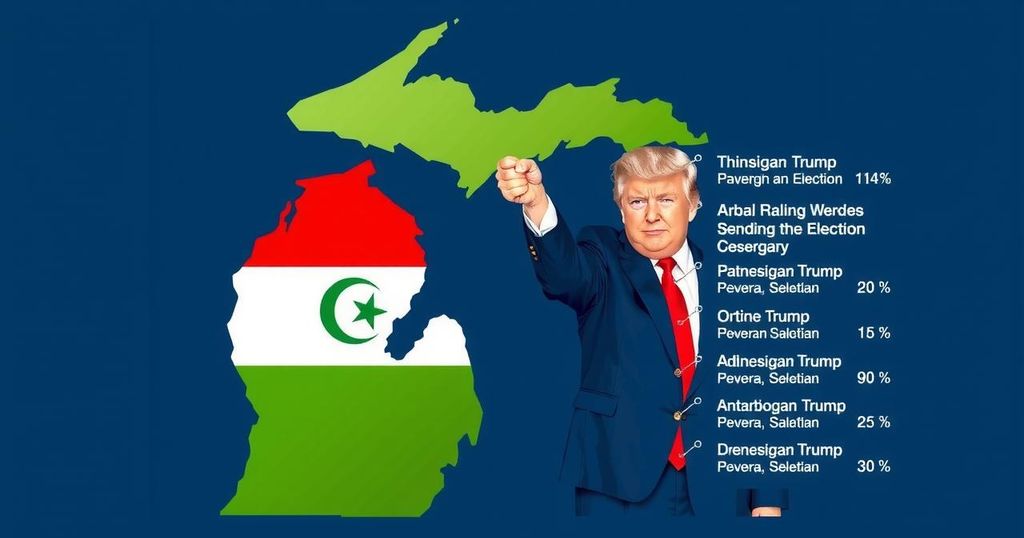Shift in Arab American Voter Support Towards Trump in Michigan Amid Ongoing Conflict

Arab American voters in Michigan are increasingly gravitating towards Donald Trump in the lead-up to the 2024 election, driven by dissatisfaction with the Democratic Party’s response to the Israeli military actions in Gaza and Lebanon. Activists like Samraa Luqman argue that this community feels taken for granted and that supporting Trump represents a gamble worth taking to demand accountability. This trend reflects a significant shift in electoral dynamics and may position Arab American voters as a decisive influence in Michigan’s swing state status.
In the current landscape of American politics, a noteworthy shift is emerging among Arab American voters in Michigan, with many expressing growing support for Donald Trump as the 2024 election approaches. This trend is primarily fueled by disappointment in the Democratic Party’s response to the Israeli military interventions in Gaza and Lebanon, which many feel have been inadequately addressed by Vice President Kamala Harris and President Joe Biden. Samraa Luqman, a Yemeni American activist from Dearborn, articulates a sentiment prevalent in the Arab community: “For too long, Democrats have taken the Arab vote for granted, and it is time for them to pay the price for the United States-backed Israeli war on Gaza and Lebanon.” Luqman’s comments reflect a broader dissatisfaction with the current administration’s unequivocal support for Israel amidst ongoing violence. The discontent has opened channels through which Trump, despite his controversial past regarding Muslim and immigrant communities, has engaged with disillusioned Arab Americans. His recent visit to Dearborn, an area with a significant Arab demographic, serves to underscore this trend. While Trump has historically taken stances perceived as hostile to Muslim communities, his outreach efforts aim to present alternatives for voters seeking change. Luqman asserts that many in her community view support for Trump as a calculated risk, stating, “Even if he will continue this genocide at a 99 percent chance, I’m going to take that 1 percent chance that he’s going to stop it, as opposed to the 100 percent chance that it’s going to continue under Harris.” This sentiment is echoed among local business owners like Albert Abbas, who criticized the existing political leadership for neglecting Arab American issues, calling attention to the “betrayal of those in power.” Many supporters express a desire for Trump to facilitate peace in the Middle East, contrasting this aspiration with their views of Biden and Harris’s policies. Leaders like Hamtramck’s Mayor Amer Ghalib and Dearborn Heights Mayor Bill Bazzi have also aligned themselves with Trump’s campaign, citing a shared hope for diminished military conflict and an improved economy. However, many voices within the community, including current Dearborn Mayor Abdullah Hammoud, express disdain for Trump’s divisive tactics and remind constituents of his past actions which many view as harmful to Arab and Muslim interests. The political dynamics underscore a significant moment of potential realignment within a key voter base, as Trump capitalizes on a perceived crisis of representation while raising questions about the future unity of the Arab American electorate in a polarized national landscape. As Arab American voters in Michigan grapple with these issues, the electoral choices they make this cycle could redefine their role within the broader political context, posing a challenge to both dominant parties’ assumptions about their support. Their emergence as a crucial swing vote might compel parties to reconsider their strategies, as reflected in Luqman’s assertion: “If we exert our political muscle, and we show that we have an impact that will cause reverberations in the elections, it will show that we have the strength and the voter bloc to make a change.”
The article discusses the evolving political preferences of Arab American voters in Michigan as the 2024 US elections approach. Traditionally leaning Democratic, a growing number of voters are expressing support for Donald Trump due to dissatisfaction with the Democratic Party’s handling of the Israeli-Palestinian conflict, particularly in light of the ongoing military actions in Gaza and Lebanon. This shift highlights the impact of foreign policy on domestic electoral dynamics and the complexities faced by minority voters in aligning with political parties that have historically taken their support for granted.
In summary, the article illustrates a significant shift among Arab American voters in Michigan, who are reconsidering their traditional allegiance to the Democratic Party in light of recent events. Many in the community feel disillusioned with the Biden administration’s unqualified support for Israel, prompting some to explore alliances with Donald Trump. This political realignment underscores the complexities of voter demographics and their potential to influence the upcoming elections, as the Arab American community emerges as a critical swing vote that may reshape future electoral strategies for both parties.
Original Source: www.aljazeera.com






